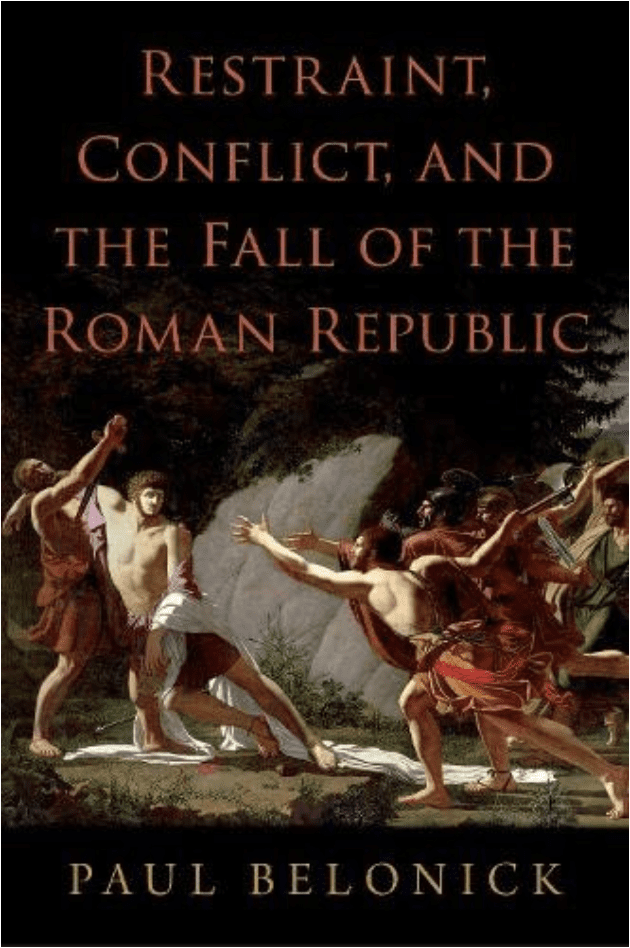UC Law SF Professor Paul Belonick Pens New Book on Fall of Roman Republic

Paul Belonick, director of the UC Law SF Center for Innovation, has written a new book about the fall of the Roman Republic.
When he’s not teaching law students or busy with his duties as director of the Startup Legal Garage and deputy director of the Center for Innovation at UC Law SF, Paul Belonick pursues his other passion: studying ancient history. In this interview, he discusses his new book, “Restraint, Conflict, and the Fall of the Roman Republic,” published by Oxford University Press.
What inspired you to write this book?
I have a Ph.D. in Ancient History, and this book started out as my dissertation. My Ph.D. advisor and I were talking about how the Roman Republic is like a car: its “gas” is that its aristocrats wanted to out-compete each other for glory and honor, usually through military conquest, which is why it expanded into a massive republic.
What inspired you to write this book?
I have a Ph.D. in Ancient History, and this book started out as my dissertation. My Ph.D. advisor and I were talking about how the Roman Republic is like a car: its “gas” is that its aristocrats wanted to out-compete each other for glory and honor, usually through military conquest, which is why it expanded into a massive republic.
But what keeps that competition from running off the road into civil war immediately? Or, to lose the metaphor, how did a Roman Republic that centers competition manage to stay cohesive for centuries, and why did it then (rather suddenly) fail? This book is an attempt to get at those questions.
What do you hope people take away from this book?
Strongly-held values can stabilize a society. They can also splinter it. The standard Roman answer to why their Republic failed is “because our morals failed.” Historians of Rome don’t really believe that is true, but have struggled to come up with an answer that explains why the Republic fell apart and why the Romans were completely convinced it was due to bad morals.
This book shows how Roman “morals” were actually norms of behavior that helped their government run for a very long time. But for that very reason, those same norms were politically sensitive, and could create hot emotion.

Paul Belonick’s new book examines lingering questions about the fall of the Roman Republic.
Because the norms have such hot emotional and political valence, opposing disputants quickly turn each other into immoral enemies “destroying” the Republic. Once that happens, trust in the government’s legitimacy eventually collapsed, and the only way to “solve” things was violence. This explains both how the Republic destabilized without actually “losing” morals, and how the Romans could be convinced it was because of “lost morals,” all at the same time. The same norms or values stabilize the Republic at one point in time, and destabilize it at another.
Why is this book important now?
I’m not a “We’re just like Rome and about to fall” person—our society and its institutions and government structures are very different from Rome’s, and our Founders were quite deliberate about that. But I do think it’s important to remember that norms are powerful and that they support and guide rules and institutions and procedures that we might otherwise take for granted. We’ve gotten a lot of that lesson in the political realm recently.
Norms can be double-edged swords. They can help a society run, or they can be a flashpoint for social fraying if people with different interpretations of norms see the norms as sacred and see each other as desecrating enemies to be destroyed for the “good” of the nation.
Our institutions and structures have been put to real tests recently. But (so far) they’ve held, and largely because of the great work of judges and lawyers insisting on applying the law dispassionately even under great social and emotional pressure—what I’d call the rule of law. So I’m confident liberal democracy is resilient. Not perfect, and certainly bruised, but currently resilient.
In some ways, the “Rome declined and so are we” argument is a self-fulfilling prophecy: once you’re convinced your society is failing, you become tempted to make terrible, panicked decisions to stop the “failing” that in fact only fray social relations and thereby accelerate real societal failure.
I always remember that we have the choice not to go back to Rome’s way. It takes commitment to even-handed application of law and rules and norms when we don’t feel like applying them evenly to rivals. Those are choices, and hard ones. I bet we can make them though.
A Conversation with Paul Belonick on His Book, Restraint, Conflict, And The Fall Of The Roman Empire